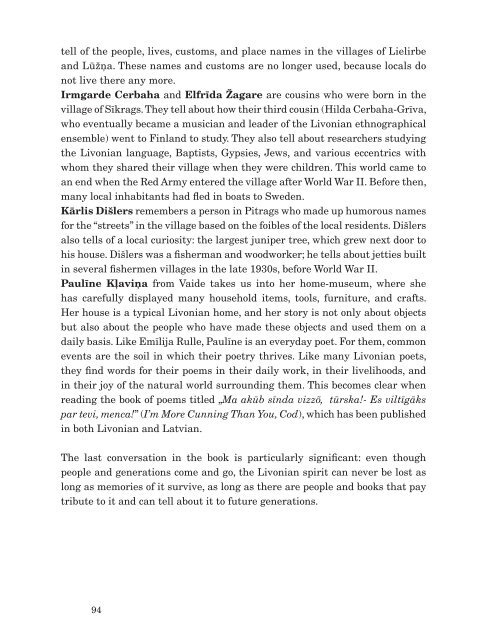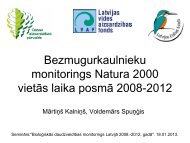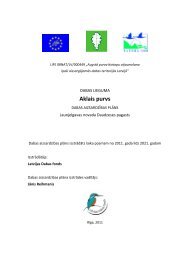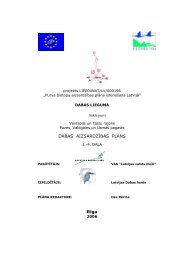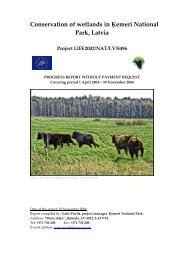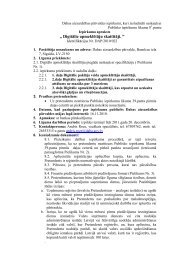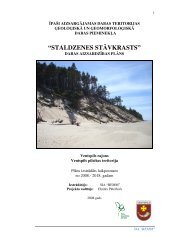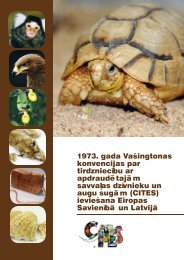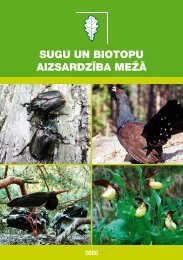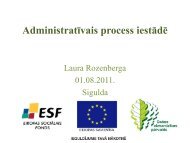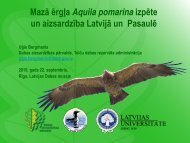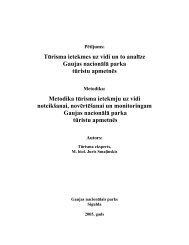Lībieši Ziemeļkurzemes ainavā - Dabas aizsardzības pārvalde
Lībieši Ziemeļkurzemes ainavā - Dabas aizsardzības pārvalde
Lībieši Ziemeļkurzemes ainavā - Dabas aizsardzības pārvalde
Create successful ePaper yourself
Turn your PDF publications into a flip-book with our unique Google optimized e-Paper software.
tell of the people, lives, customs, and place names in the villages of Lielirbe<br />
and Lūžņa. These names and customs are no longer used, because locals do<br />
not live there any more.<br />
Irmgarde Cerbaha and Elfrīda Žagare are cousins who were born in the<br />
village of Sīkrags. They tell about how their third cousin (Hilda Cerbaha-Grīva,<br />
who eventually became a musician and leader of the Livonian ethnographical<br />
ensemble) went to Finland to study. They also tell about researchers studying<br />
the Livonian language, Baptists, Gypsies, Jews, and various eccentrics with<br />
whom they shared their village when they were children. This world came to<br />
an end when the Red Army entered the village after World War II. Before then,<br />
many local inhabitants had fled in boats to Sweden.<br />
Kārlis Dišlers remembers a person in Pitrags who made up humorous names<br />
for the “streets” in the village based on the foibles of the local residents. Dišlers<br />
also tells of a local curiosity: the largest juniper tree, which grew next door to<br />
his house. Dišlers was a fisherman and woodworker; he tells about jetties built<br />
in several fishermen villages in the late 1930s, before World War II.<br />
Paulīne Kļaviņa from Vaide takes us into her home-museum, where she<br />
has carefully displayed many household items, tools, furniture, and crafts.<br />
Her house is a typical Livonian home, and her story is not only about objects<br />
but also about the people who have made these objects and used them on a<br />
daily basis. Like Emīlija Rulle, Paulīne is an everyday poet. For them, common<br />
events are the soil in which their poetry thrives. Like many Livonian poets,<br />
they find words for their poems in their daily work, in their livelihoods, and<br />
in their joy of the natural world surrounding them. This becomes clear when<br />
reading the book of poems titled „Ma akūb sīnda vizzõ, tūrska!- Es viltīgāks<br />
par tevi, menca!” (I’m More Cunning Than You, Cod), which has been published<br />
in both Livonian and Latvian.<br />
The last conversation in the book is particularly significant: even though<br />
people and generations come and go, the Livonian spirit can never be lost as<br />
long as memories of it survive, as long as there are people and books that pay<br />
tribute to it and can tell about it to future generations.<br />
94


